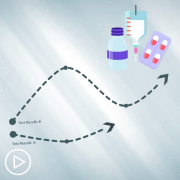Which Tests Do You Need Before Deciding on an AML Treatment Path?
Which Tests Do You Need Before Deciding on an AML Treatment Path? from Patient Empowerment Network on Vimeo.
Why is it important to ask about biomarker testing for your AML? Find out how test results could reveal more about your AML and may help determine the most effective treatment approach for your individual disease.
Related Resources:

|

|

|
Transcript:
Why do you need biomarker testing before deciding on a treatment plan for your acute myeloid leukemia—also known as AML?
The results may predict how your AML will behave and could indicate that one type of treatment may be more effective than another.
Biomarker testing—also referred to as risk stratification, genetic testing, or molecular testing—identifies specific gene mutations, proteins, chromosomal abnormalities and/or other molecular changes that are unique to your AML.
The results of these tests are used to determine if you have low-risk or high-risk AML to help guide prognosis and to evaluate the goals of treatment.
There are certain biomarkers—such as the FLT3, IDH1 and IDH2 mutations—that could indicate that your AML may respond well to a targeted therapy. There are several FDA-approved targeted therapies—known as inhibitor therapies—which treat patients with these mutations.
Additionally, the identification of other biomarkers—such as TP53, NPM1, or CEBPA mutations, to name a few—may aid in assessing your prognosis, determining a treatment course, or may identify if an allogeneic stem cell transplant may be appropriate. Results of these tests may also suggest that a clinical trial is your best treatment option.
So, how can you Insist on the best care for YOUR AML?
• First, always bring a friend or a loved one to your appointments to help you process information and to take notes.
• Ask your doctor if you have had, or will receive, biomarker testing and how the results may impact your care and treatment plan. Be sure to ask for paper or electronic copies of your important test results.
• Finally, always speak up and ask questions. It’s important that you understand all of the information that you want to know about your AML to help make the best treatment decisions for you. You are your own best advocate, and treating AML is a team approach.
To learn more about your AML and to access tools for self-advocacy, visit powerfulpatients.org/AML.










